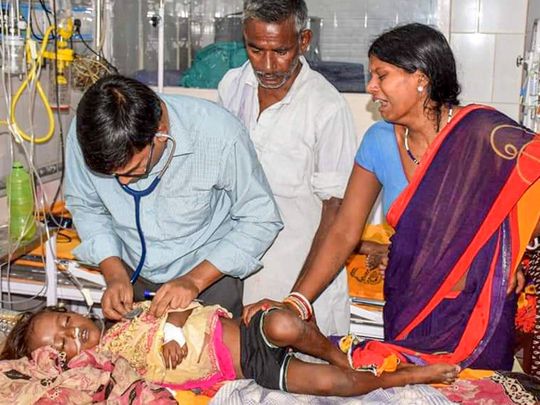
Dubai: Health and hygiene come on the top of parents’ list of concerns when travelling to India with children.
From seasonal outbreaks to poor hygiene and water-borne diseases, parents travelling to India have to be extra prepared to prevent or tackle a bout of sickness.
According to Indian news websites, reportedly 36 children died in Bihar’s Muzaffarpur district in the last 48 hours and 133 children were admitted to hospitals due to suspected Acute Encephalitis Syndrome (AES).
We asked Indian parents in the UAE if they were aware of the issue and what precautions they take when travelling to the home country during summer break for schools here.
Acute Encephalitis Syndrome outbreaks
In India, AES outbreaks have become a routine in summer in and around flood-prone north Bihar districts, where the disease is locally known as “Chamki Bukhar” or “Mastishk Bukhar”.
It is a severe case of encephalitis transmitted by mosquitoes.
According to doctors, high temperatures during summer, along with humidity more than normal, is considered to be an ideal situation for the outbreak of AES. It is characterised by high fever, inflammation of the brain, vomiting, nausea, and unconsciousness.
Indian mother Chitra Bhatia, 37, is aware of the disease and says she is extra careful while travelling to India during monsoons. She said: “I try to keep my six-year-old son indoors as much as possible if I am visiting India during the rainy season.”
But, that’s not it. Just before travelling to India, she makes sure her children are given flu shots. Chitra, who also has a six-month-old baby, takes enough water from Dubai to last her children till they reach home in Mumbai. She said: “Once we reach, I give them water that has been boiled and cooled.”
To avoid diseases that spread through mosquito bites, she uses insect repellents. She also added: “I dress the children in clothing that covers their arms and legs. And, we avoid being outside at dawn and dusk, when mosquitoes are most active.”

I dress the children in clothing that covers their arms and legs. And, we avoid being outside at dawn and dusk, when mosquitoes are most active.
During summers, Chitra said the family uses air conditioning if available.
UAE-based mum, Amrita Vidyarthi, 38, avoids travelling in extreme weather altogether. Additionally, she said: “Appropriate clothing is essential to keep the children from feeling too hot or too cold. I mostly prefer fully covered clothes when we go out in India to avoid insect bites and use insect repellant creams.”
Hygiene
Amrita said one of her main concerns is hygiene in public toilets, including malls and diseases spread by mosquitoes and other insects. She said: “Sometimes you have to travel to India irrespective of disease outbreaks. So I don’t always do research on this, such as AES but I take care of hygiene. I prefer bottled water, however, if we are visiting someone, I don’t have an option. As for food, I avoid giving children street food and give them freshly cooked food at home.”

Sometimes you have to travel to India irrespective of disease outbreaks. So I don’t always do research on this, such as AES but I take care of hygiene.
Immunity and shots
Amrita ensures her children get annual flu shots. However, Jaishree Jaiswal, another Indian mother based in Dubai takes her preparation a step further. Not only does she read up about health-related news in India before travelling, but also, always takes her daughter to the doctor to find out what vaccination needs to be taken. She said: “Last time we travelled there was dengue, so I read about what preventive actions I could take. I found out that neem oil and neem leaves keep mosquitoes away. We even called the local municipality to spray medicines to keep the mosquitoes away.

Last time we travelled there was dengue, so I read about what preventive actions I could take. I found out that neem oil and neem leaves keep mosquitoes away.
“I give importance to vaccinations and herbal medicines and keep myself updated with home remedies to tackle such situations.”
Jaishree, who is a 46-year-old tutor in Dubai said that her preparations begin a month or two in advance from the scheduled date of travel. She said: “I start giving my daughter supplements such as B12 and omega-3 to boost her immune system, a month or two before we travel. If the child’s immune system is strong, chances are they will be safe from diseases.”
Additionally, Jaishree who travels mostly to Nagpur and Mumbai, tries to make sure her daughter drinks only boiled and clean water and keeps her from eating street food from road-side hawkers.








